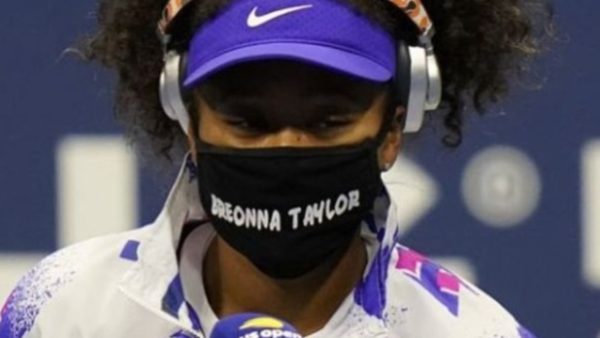SMH: International Olympic Committee Bans Black Lives Matter Apparel, Protests During Competition at This Summer’s Tokyo Games
After the 2020 Tokyo Olympics Games was postponed last year due to the coronavirus pandemic, a few new rules were created for this year’s event. Besides being required to pass a multitude of coronavirus tests, the International Olympic Committee also is forbidding Olympic athletes from wearing any “Black Lives Matter” apparel during competition at the Games.
It was reported on April 21 that athletes are banned from protesting and could be sent home if they are caught protesting. The IOC did say that words like “peace,” “equality,” “solidarity,” “inclusion” or “respect” are permitted to be used on the athletes’ clothing, but anything that demonstrates any type of protest is forbidden and that includes kneeling or raising a fist.
Naomi Osaka wore a face mask with Breonna Taylor’s name on it, Monday, Aug. 31 at the US Open. (Photo: @naomiosaka/Instagram)
The decision comes after a poll revealed 70 percent of athletes were in favor of keeping the ban. Out of 3,500 replies over two-thirds said it is not appropriate to demonstrate during competition and 60 percent said it would not be appropriate to do it on the medal stand.
The rule falls under the IOC’s long-established Rule 50, which bars any “demonstration or political, religious or racial propaganda.” Although the IOC says they’re “fully supportive of freedom of expression” they claim the rule is put in place “to ensure that each and every athlete can experience the Olympic Games without any divisive disruption.”
The IOC did not specify what type of punishments athletes would receive for violating any of these rules, saying instead it would will handle each person’s violations individually.
There has been no response from competing athletes about the matter, but several nonprofit organizations have already announced their intent to support to any athletes who want to protest. United States Olympic & Paralympic Committee Chief Executive Officer Sarah Hirshland released a statement saying, “values the voices of athletes and believes that their right to advocate for racial and social justice as a positive force for change aligns with the fundamental values of equality that define Team USA and the Olympic and Paralympic movement.” New guidelines were created in regard to the athletes who want to protest, and under them athletes are allowed to wear “Black Lives Matter” hats and masks. However, these guidelines only apply to the U.S. Olympic Trials, not the Tokyo Olympics.
The Tokyo Olympics will begin this summer on July 23.

